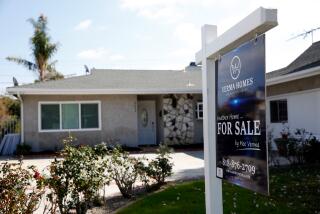Home Improvements Often Do Not Raise Resale Value
When Margaret Maxwell and her husband, John, spent thousands of dollars to install a unique pool in their back yard in El Cajon, they did it in hopes that at least some of their investment might someday end up back in their pockets.
“I think that any time you do something to your house, you do it with the hope that it will improve the value of the house,” Margaret Maxwell said.
But home experts caution that not all home improvements are good investments, and in some cases they can even lower the market value of a house.
Pools and spas, which generally are worth about half of their cost when a home is resold, are two improvements that commonly disappoint homeowners when brokers tell them how much they are worth to prospective buyers, said Joe Garcanelli, a realtor and co-owner of Century 21 All Service in El Cajon.
“When somebody spends money on a house, they expect to get their money back,” he said. “They will add a family room or a pool, and they will invest more than they will ever get back. . . . They’re disappointed; I understand that. But I have to tell them what the market value is.”
Although high quality improvments done by homeowners often can result in a profit when a home is sold, the most homeowners can expect from a typical job done by a building contractor is usually a dollar-for-dollar return on their investment, Garcanelli said. The high cost of labor paid by homeowners to contractors is usually difficult to recoup in a home sale.
The best investments homeowners can make are kitchen and bathroom remodeling, roof repairs, landscaping and lighting improvements, Garcanelli said.
The key to getting good resale return on improvements is to use styles and colors that are appealing to mainstream homeowners, Garcanelli said. Homeowners are almost sure to be disappointed by the impact on the value of their homes if they do landscaping or decorating to satisfy highly individualistic tastes, he said. In extreme cases, unconventional changes can decrease the value of a home, he said.
Tom Myers, owner of a San Diego appraisal firm, said one of his customers in Santee spent more than $20,000 to add a poorly designed master bedroom and bathroom that could only be reached by a stairwell on the outside of the home. Myers said the man was “shocked” last year when he decided to sell the home and was told by Myers that the work added nothing to the value of his home, and may have even hurt his chances of selling it.
“Real poor room designs are typically the worst things we see,” Myers said. “They stick a box-type structure on the roof of the garage and they say, ‘that’s the master bedroom.’ ”
Myers called such ill-planned additions “the kiss of death” for people trying to sell a home, and said homeowners should spend the extra money to consult contractors or appraisers before they jump into major projects.
“Cost does not equal value,” he said. “If you’re going to do it, spend a little extra money and get it done right.”
Marjorie McLaughlin, president of the San Diego Assn. of Realtors, agreed.
“There are certain things that are so personal, like decorating, that they can be disappointments when it comes time to sell,” she said.
One of the surest ways to make the value of a home drop is to add living space that does not fit well with the floor plan of the house, such as a room that must be entered through another room, Garcanelli said.
Like Garcanelli and McLaughlin, Myers also emphasized that excessive personal creativity can make a home difficult to sell.
“Sometimes that’s all it takes to turn a buyer off, and you have just lost a sale,” he said. “At least people can live with neutral colors, and personalize it as they wish.”
Ray Prazen, who recently had about $15,000 of patio work and landscaping done at his El Cajon home, said he consulted a realtor to learn what types of improvements would make good investments. He said that, although he enjoys the improvements, resale value was critical in his decision to spend the money.
Prazen said that, although he has no plans to move soon, he wanted to consider the effect of the changes on the overall value of his home because “you never know” when a move might be necessary.
“It will be well worth it,” he said. “I think I can get all the money I put into it back.”
Jack Lewis, owner of Jack Lewis Realty in Coronado, said pools--the most common source of disappointment to optimistic homeowners--are a hit-and-miss gamble for those seeking a big return on their investment. Some buyers are looking for homes with pools, but just as many consider them a nuisance.
“A lot of people just don’t want them,” he said. “They have kids running around, and pools are not cheap to maintain.”
Myers, owner of the appraisal firm, said the investment value of a pool is partly dependent on the value of the house it is being added to.
“It depends on the price range,” he said. “In the million-dollar plus range, pools are almost a necessity.”
However, in homes worth less than $200,000, the value of pools drops dramatically, he said. Home-buyers looking in that price range are often first-time buyers looking for “basic shelter,” and they often see pools as nothing but an “expense and a worry.”
More to Read
Inside the business of entertainment
The Wide Shot brings you news, analysis and insights on everything from streaming wars to production — and what it all means for the future.
You may occasionally receive promotional content from the Los Angeles Times.










